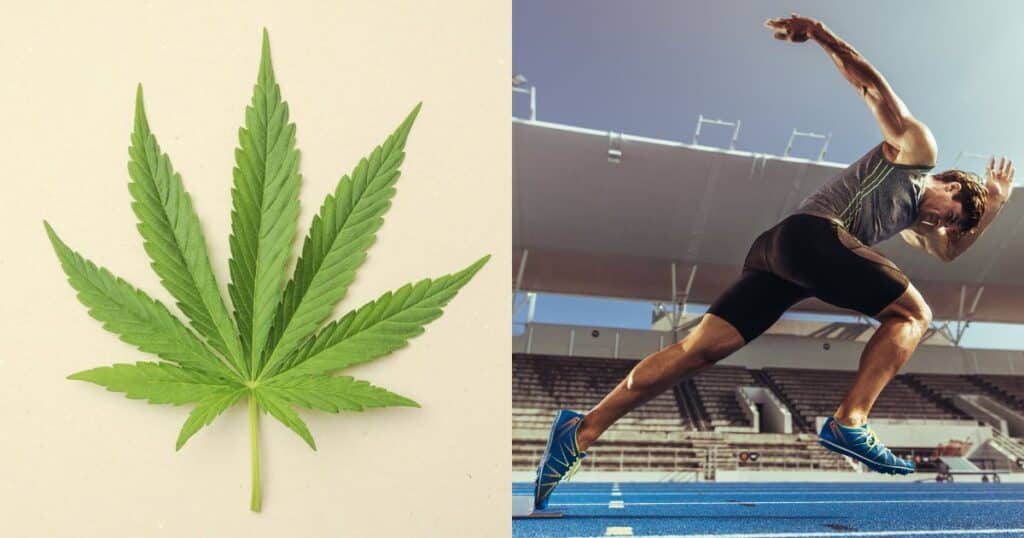With the conclusion of the Paris Olympics this weekend, the debate surrounding the use of recreational drugs, particularly cannabis, among athletes has been reignited. A recent survey reveals that a significant portion of Americans believe that using recreational drugs, particularly cannabis, should not automatically disqualify athletes from competing in the Olympics. This highlights the increasing recognition of cannabis not as a performance-enhancing drug but rather as a potential aid for athletes in their recovery process.

Survey’s Findings
The Boca Recovery Center surveyed 1,000 Americans, uncovering insights about their attitudes towards recreational drug use among Olympic athletes. A striking 42% of respondents believe that recreational drug use should not disqualify athletes from competing. This sentiment is particularly strong among Millennials, with 52% supporting this stance.
Over 80% of those surveyed believe there should be a clear distinction between performance-enhancing drugs and recreational substances. This distinction is crucial for shaping fair and reasonable drug policies for athletes.
The survey highlights that 63% of Americans think athletes should be able to use cannabis without facing penalties. This is a higher percentage than those who support the use of alcohol (62%) and tobacco (60%). The changing perceptions around cannabis indicate a shift towards a more lenient understanding of drug policies.
Sha’Carri Richardson’s ban from the 2020 Tokyo Olympics after testing positive for cannabis ignited public outrage. Richardson used cannabis to cope with the loss of her mother, yet faced severe consequences. This case highlighted the need to reassess cannabis bans in international sports.
Similarly, 84% of survey respondents disagreed with the decision to send Japanese gymnast Shoko Miyata home from the Paris Olympics after she was caught smoking cigarettes.
USADA CEO Weighs In On Cannabis Use Among Athletes
Travis Tygart, the CEO of the U.S. Anti-Doping Agency (USADA), has been vocal about the need for reform. in a recent article by Yahoo, he argues that athletes should only face punishment for cannabis use if it poses a health and safety risk or provides a significant competitive advantage. Tygart’s stance aligns with the survey’s findings, emphasizing that cannabis lacks performance-enhancing benefits.
“It’s disappointing,” Tygart told Yahoo Sports. “I think we should all just be open and upfront about marijuana’s lack of performance-enhancing benefits. We’re not in the recreational drug policing business. We’re here to prevent fraud in sport and cheaters in sport.”
Despite growing public support for cannabis use, the World Anti-Doping Agency (WADA) maintains its ban on the substance. WADA’s review of cannabis found mixed opinions on its performance-enhancing capabilities but concluded that it poses potential health risks and violates the “spirit of sport.” This stance has faced criticism from both athletes and experts.
Cannabis is a Non-Performance Enhancing Substance with Potential Benefits for Athletes
Cannabis is widely recognized for its therapeutic properties rather than as a performance-enhancing drug. Unlike steroids or stimulants, which have clear advantages in increasing strength or endurance, cannabis does not provide athletes with a competitive edge studies show.
Instead, many athletes have reported that cannabis helps them recover from physical exertion, manage pain, and reduce anxiety while making exercise more enjoyable. Its anti-inflammatory effects can aid in muscle recovery, allowing athletes to train more effectively and maintain peak performance levels over time.
In recent years, major sports leagues in the United States, such as the NBA and NFL and, most recently, the NCAA, have begun to revise their policies concerning cannabis use. These organizations are increasingly acknowledging the need to separate recreational drug use from performance-enhancing substances, reflecting a broader shift in societal attitudes toward cannabis.
The receptiveness of these leagues to new policies underscores an understanding of the potential benefits of cannabis for athletes’ mental health and recovery processes, challenging outdated perceptions that regard it solely as a disqualifying substance.
This evolving landscape suggests that as more data and personal testimonies emerge, sports organizations may continue to reconsider their stances on cannabis use in competitive settings.
Public Sentiment and the Future of Olympic Drug Policies
The survey results indicate a significant shift in public opinion towards more lenient drug policies for athletes. The majority of Americans believe that recreational drug use, especially cannabis, should not automatically disqualify athletes from competing.
Given the strong public support for cannabis use among athletes, it’s time for international sports organizations to reconsider their stance. Implementing more reasonable and fair policies that differentiate between performance-enhancing and recreational substances could benefit athletes and the integrity of sports.
The recent survey by Boca Recovery Center sheds light on American attitudes towards recreational drug use among Olympic athletes. The findings reveal strong support for cannabis use, with many Americans believing it should not disqualify athletes from competing. This shift in public opinion calls for a reevaluation of current drug policies to ensure they are fair and reasonable. As we look towards the future of sports, it’s essential to align our policies with evolving societal norms and scientific understanding.























